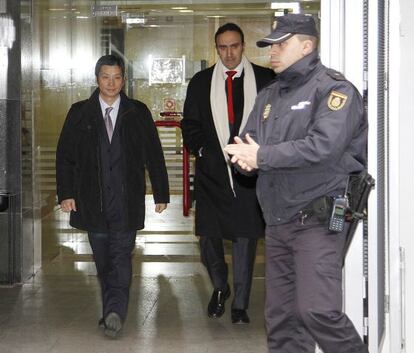Judge under scrutiny over release of alleged cash-laundering suspects
How long a defendant can be held is the legal question being fiercely debated

When 20 members of an alleged international money laundering ring were released from preventive custody because of legal technicalities, not only did it deal a blow to one of the biggest investigations into organized crime in Spain in recent years but it also compromised the reputation of the Spanish High Court.
A ruling by a court panel this month, which has become the subject of a fierce debate between other judges and prosecutors, concluded that four of the arrests were illegal, paving the way for 16 other suspects in the so-called Operation Emperor investigation to also be released. Among them was the alleged ringleader Gao Ping, who was set free on Thursday.
But the case also places Judge Fernando Andreu -- who investigated the ring for years before ordering the arrest sweep in mid-October -- at the center of an ethical battle. Five of the defendants have said they will file complaints against the judge before the Supreme Court. This could put Andreu in a similar situation as his former colleague Baltasar Garzón, who was suspended from High Court duties for 11 years by a Supreme Court panel in February for ordering illegal wiretaps in the Gürtel corruption case. In that instance, the Supreme Court ruled that Garzón impaired the suspects' defense strategies.
In Andreu's case, the complaints to be filed will allege that the judge illegally ordered their detentions. But judges and prosecutors have opened an intense debate over how long a person can be held between the moment of arrest and being ordered to see the judge.
The majority of magistrates follow a law from 1882, which states that police have 72 hours from the time they are arrested to interrogate suspects, conduct searches and prepare a preliminary case before a suspect is taken in front of a judge. From that time, the judge and the court have the suspects under their jurisdiction for another 72 hours to take statements and determine whether they should be granted bail, held in preventive custody or set free. In all, a suspect could be held for up to six days before a decision is made.
In Operation Emperor, Andreu acted precisely under this interpretation of the law. The ringleaders were detained on bench warrants on the morning of October 16. At the same time, Andreu ordered the police to carry out 120 searches, in which all the suspects were present. Later, the judge began taking statements from 108 people rounded up in the inquiry and, following the usual procedures, left the group's alleged ringleader, Gao Ping, to testify last.
But realizing that the first 72-hour period was going to expire at 10pm on October 18, the judge issued a new order asking the police to bring to court the 29 suspects who had not appeared before him but were being kept in police holding cells. However, he asked the officers to transfer them to prisons "if spaces were available" at the different jails.
His ruling also prohibited the police from continuing to conduct their investigations during this period. Court officers read the defendants their rights and a judicial medical team conducted examinations of the suspects. By putting them under his jurisdiction, Andreu believed that he had another 72 hours to determine whether to keep them in preventive custody. The 20 who were set free last week appeared before him on October 19 and 20.
Several of the defendants filed appeals against Andreu's order, and on November 20, a High Court appeals panel confirmed the jailing of one of Gao's chief assistants, Kai Xu, even though he testified after the first 72-hour period following his arrest. But two days later, Carlos Aguirre de Cárcer, lawyer for Gao's alleged accountant, Kay Yang, filed an appeal based on a 2011 Constitutional Court decision that states that an investigative judge only has one 72-hour period, which cannot be extended, to decide whether to send suspects to jail. The High Court appeals panel agreed and freed Kay Yang and three other defendants; Andreu was then forced to also free 16 others under the court's order.
Andreu and other High Court judges, magistrates at different courts and prosecutors mostly disagree with the interpretation. They said that the Constitutional Court handed down that ruling in another case, the 2006 Operation Malaya Marbella corruption investigation, under completely different circumstances. In that instance, the investigative judge put all the defendants under his jurisdiction and threw them in jail without allowing the police to conduct any further preliminary investigations.
In Operation Emperor, Andreu states, once the arrests were made all of the suspects remained under police jurisdiction, so that they could conduct the 120 searches in their presences. To support this, the judge said he has proof that demonstrates the police released many suspects after they had conducted the searches — something that he would have had to have done if they had been under his own jurisdiction.
Tu suscripción se está usando en otro dispositivo
¿Quieres añadir otro usuario a tu suscripción?
Si continúas leyendo en este dispositivo, no se podrá leer en el otro.
FlechaTu suscripción se está usando en otro dispositivo y solo puedes acceder a EL PAÍS desde un dispositivo a la vez.
Si quieres compartir tu cuenta, cambia tu suscripción a la modalidad Premium, así podrás añadir otro usuario. Cada uno accederá con su propia cuenta de email, lo que os permitirá personalizar vuestra experiencia en EL PAÍS.
¿Tienes una suscripción de empresa? Accede aquí para contratar más cuentas.
En el caso de no saber quién está usando tu cuenta, te recomendamos cambiar tu contraseña aquí.
Si decides continuar compartiendo tu cuenta, este mensaje se mostrará en tu dispositivo y en el de la otra persona que está usando tu cuenta de forma indefinida, afectando a tu experiencia de lectura. Puedes consultar aquí los términos y condiciones de la suscripción digital.








































